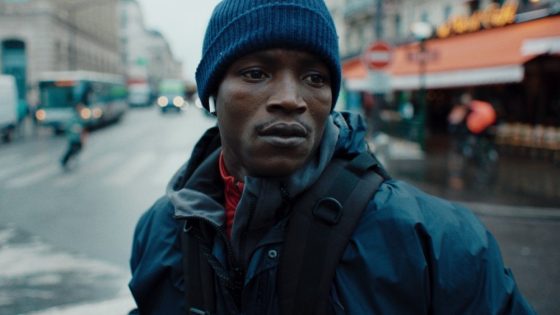It’s not only because of its similar time frame that Boris Lojkine‘s hurtling, headlong social-issues drama “The Story of Souleymane” recalls “Two Days, One Night” by the Dardenne brothers. Lojkine’s film, which was awarded the jury prize and a well-deserved best actor award in the Un Certain Regard competition in Cannes, is similarly invested in its electrifying lead — non-professional Abou Sangare, making an unforgettably persuasive and poignant debut — and similarly effective in maintaining a level of urgency and high-stakes personal peril that few genre thrillers can muster. If the hero’s dire situation is a ticking clock, Lojkine’s intelligent and empathetic film places us right alongside him, with each cog of circumstance and each gear of good fortune grinding against him at every turn.
Souleymane (Sangare) is a recent arrival in Paris from Guinea, who sleeps in homeless shelters at night and works as a delivery biker by day using a “borrowed” account for which he pays a hefty cut of his earnings to the real owner, Emmanuel (Emmanuel Yovanie). It is a hard, physically demanding existence, lived in the teeth of a daily litany of deadlines, not only the countdowns on the constantly-dinging app, but metro timetables, documentation appointments and the unforgiving bus schedule. And that’s just on a good day when he hasn’t had to scoot across town to find Emmanuel to face-verify one of the app’s random authentication checks.
Still, even within his unenvied community of fellow asylum-seekers and unhoused strivers, Souleymane — good-natured, hardworking and handsome — has made an impression. “Souleymane of Paris!” his friends call out as he whizzes past them on the street, like he’s an aristocrat touring his lands on two wheels, rather than an undocumented gig worker keeping a largely dismissive Parisian middle class in pad thai and pizzas.
In two days’ time, Souleymane will sit a make-or-break interview with OFPRA, the French governmental agency that deals with immigrant issues. In the meantime, he is paying a broker, Barry (Alpha Oumar Sow) to help him get his papers in order and to advise him on the process. Barry insists that Souleymane’s real asylum story is not enough to sway the OFPRA committee, and provides him with a juiced-up, politicized script, involving torture and imprisonment, to recite instead. “I don’t want to lie,” says Souleymane, but laboriously commits these new details to memory anyway.
In order to pay Barry, Souleymane works every spare second he can, soldiering on even when a collision with a car injures him and damages his precious bicycle. Even then, his employment is precarious. Not only does he have to get Emmanuel to release his earnings to him, but like all couriers, he is subject to star-ratings and the complaints reporting process — a system set up exclusively to protect the user and the company at the expense of the expendable riders. Aside from everything else, “The Story of Souleymane” works as an admonition to those of us who use food delivery apps: Short of your Uber Eats courier breaking into your house and murdering your entire family, never, ever complain to the company.
Lojkine’s taut, honed screenplay, co-written by Delphine Agut (“Inshallah a Boy”), coupled with Tristan Galand’s unobtrusively elegant yet dynamic camerawork and the pacy energy of Xavier Sirven’s editing, make the film a far smoother, better oiled vehicle than Souleymane’s scraping bike. But the formal mechanics are most impressive in how they understand that their purpose is supportive, to be there to give structure to the showcase of Sangare’s extraordinary performance. Initially embodying a rangy, street-level physicality, Sangare is magnetic, but as Souleymane’s psychology is more deeply explored, there appears to be no limit to how much soul and sensitivity the actor can bring to a character who could easily have ended up a thin collection of “good immigrant” tropes.
In a showstopping climax — a gripping scene between Sangare and Nina Meurisse, playing the perfectly efficient but not unsympathetic face of French immigration bureaucracy — all the motion and confrontation of the last couple of days is funneled into one extended close-up monologue. The ticking clocks are momentarily stilled. All breaths are held. And the film’s real conflict comes into focus: the internal battle between the truth and the expedient lie, between Souleymane’s conscience and his counsel, between the devil and the deep blue sea.
Source Agencies

